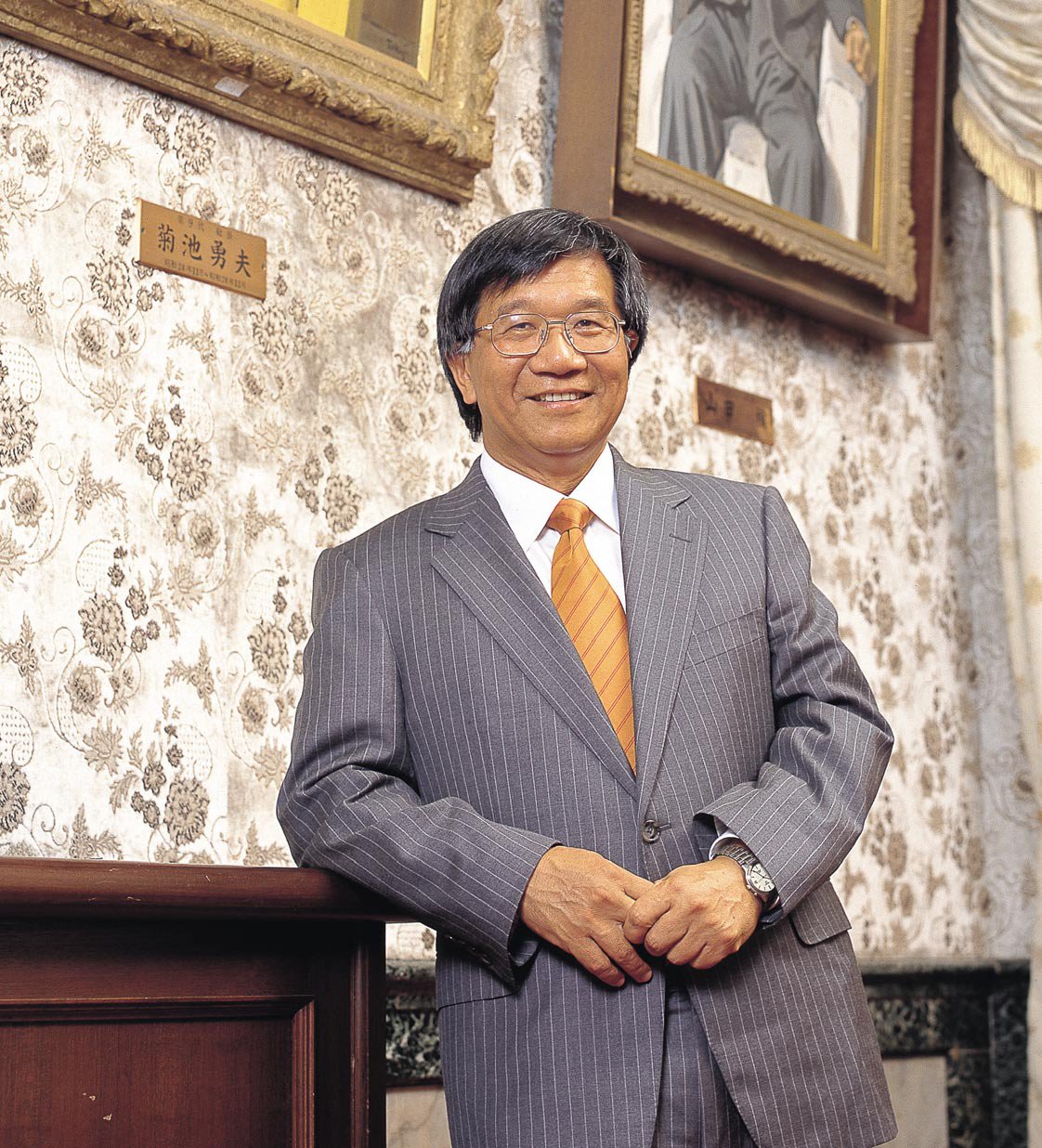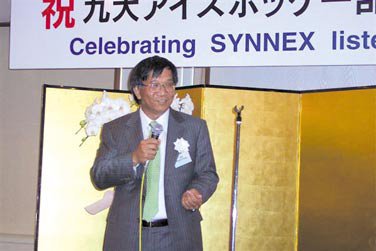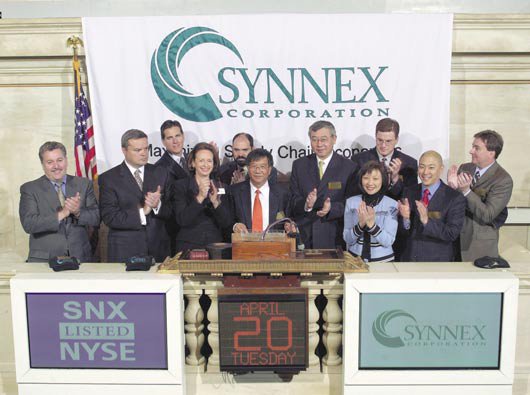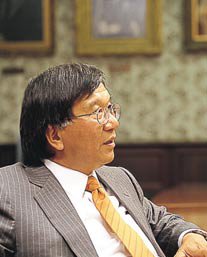
INTERVIEW
President & CEO SYNNEX Corporation
Robert Huang
(1968 Electronic Engineering graduate)
In the past, many foreign students came to study at Kyushu University. Robert Huang, who sat for our interview, is one of those students. Born in Taiwan, Robert and his family came to Japan when he was 16. After studying electronic engineering at Kyushu University, he went to the US, where he continued his studies at places like the University of Rochester and the Massachusetts Institute of Technology. The company he founded, SYNNEX, now has annual sales of 500 billion, is publicly listed in the US, and is one of North USfs leading computer-related companies. During his time at Kyushu University, he founded the Ice Hockey Club. He made time in his busy schedule to return to the university and attend the 40th anniversary of that club.
Q I understand that your mother and father passed away in Japan. Do you think of Japan now as your home country.
Huang: I was born in Taiwan, but when I was 16, my entire family came to live in Osaka for my fatherfs job. My father, in fact, studied at Kyushu University before the war. Thatfsnow a dilemma for me. I was born in Taiwan, my mother and father are buried in Japan, and I have now been living in the US for more than 30 years. During the Olympics and other such occasions, itfs hard for me to decide who to support (laughs). I feel like this problem is the fate of Taiwanese, so many of whom have left for other countries.
In my case, even after having lived in the US for over 30 years, Asian things make me feel more comfortable and emotionally connected. For me, in particular, I spent five years, in Japan, from the time I was 16 until 23, a time when people are very impressionable, so Japan occupies a very important place in my life.
QPlease tell me about your establishment of the Ice Hockey Club during your time at Kyushu University.
 |
| At the party for the 40th Anniversary of the Ice Hockey Club |
 |
| Opening Bell Ringing. In 2003, SYNNEX is publicly listed in the U.S. |
Huang: At that time, there was an indoor skating rink in Tenjin and lots of girls came. We used to go often and some of us began to think that it would be cool to skate at Kyushu University. So, I and some friends formed a skating association. Soon afterward, however, we started to think it would be fun to play ice hockey, but the skates and sticks cost money. So, we earned the money we needed by sending club members over to clean the Building and work as on-ice staff at the rink, and holding dance parties. We also pestered a former Olympic team member who was then a department manager at Oji Paper into being our coach.
QWhat was the reason for the decision to graduate from high school in Osaka and then go to Kyushu University?
Huang: The number one reason was my fatherfs love of Fukuoka, where he had once gone to school. When it came time for me to go to college, Japanfs shipbuilding industry was experiencing great success and, at first, I thought I would go to Kyushu University to study something related to shipbuilding. However, my older brother, who was in US, said that electronics would be the next big industry, so, in the end, I decided on the Electronic Engineering Department at Kyushu Universityfs School of Engineering. I think my brother, who in the 1960s was already predicting that electronics would be a business of the future, had a lot of foresight for the time.
When I was at Kyushu University, I wasnft so interested in studying (laughs), but my obsession with ice hockey led to two great results. One was that I was able to get in shape. The other was teamwork. We had no upper classmen to learn from. As the team leader, I worked with everyone else to create and develop the club. That gave me confidence, which was very useful later when I started my company.
QDo you have anything you would like to say to those who followed you at Kyushu University?
 Huang: I want even students to constantly think of how what they have learned can be applied in society. In the US, education that makes students aware of the need to use what they have learned in the real world is built into the system. And the method of teaching in primary, middle, and high schools is directed toward making students aware of even math and physics in everyday life; school subjects are not restricted to textbooks alone. Once in college, students experience work at companies through internships beginning in the second year. Also, in US education there are many occasions in which discussions take place. These encourage children to learn from the point of understanding what it is they arenft grasping. This attitude is readily apparent. I, too, want to go back to college and study something once I retire.
Huang: I want even students to constantly think of how what they have learned can be applied in society. In the US, education that makes students aware of the need to use what they have learned in the real world is built into the system. And the method of teaching in primary, middle, and high schools is directed toward making students aware of even math and physics in everyday life; school subjects are not restricted to textbooks alone. Once in college, students experience work at companies through internships beginning in the second year. Also, in US education there are many occasions in which discussions take place. These encourage children to learn from the point of understanding what it is they arenft grasping. This attitude is readily apparent. I, too, want to go back to college and study something once I retire.
There are two things I want to see in Japanese students. The first is mastery of English to the level at which they are able to freely communicate in the world and negotiate. Thatfs really difficult to accomplish once you become an adult.
The second is not to fear taking leadership. Japanese think that gthe nail that sticks out will be hammered downh (laughs) and tend to let things go, without saying what they want to say. There is risk in taking initiative, but I want them to have the courage and mentality to accept that challenge. What position Japan and Japanese will hold in the world depends on that. When I went to the US in 1968, I thought I would never see my family again. But after I came back to Japan several years later, I started traveling back and forth regularly. Travel is even easier now and will likely become even easier in the future. Regardless of the country they are from, people have opportunities to do what they want, with the world as their stage. I want students to work with a more open and global awareness, and a sense of the importance and splendor of the present time.
Thank you very much for your precious words. I wish you even greater success in your future activities.
(This interview took place on July 26, 2004 in the Room for honored guests of the Administration Bureau.)